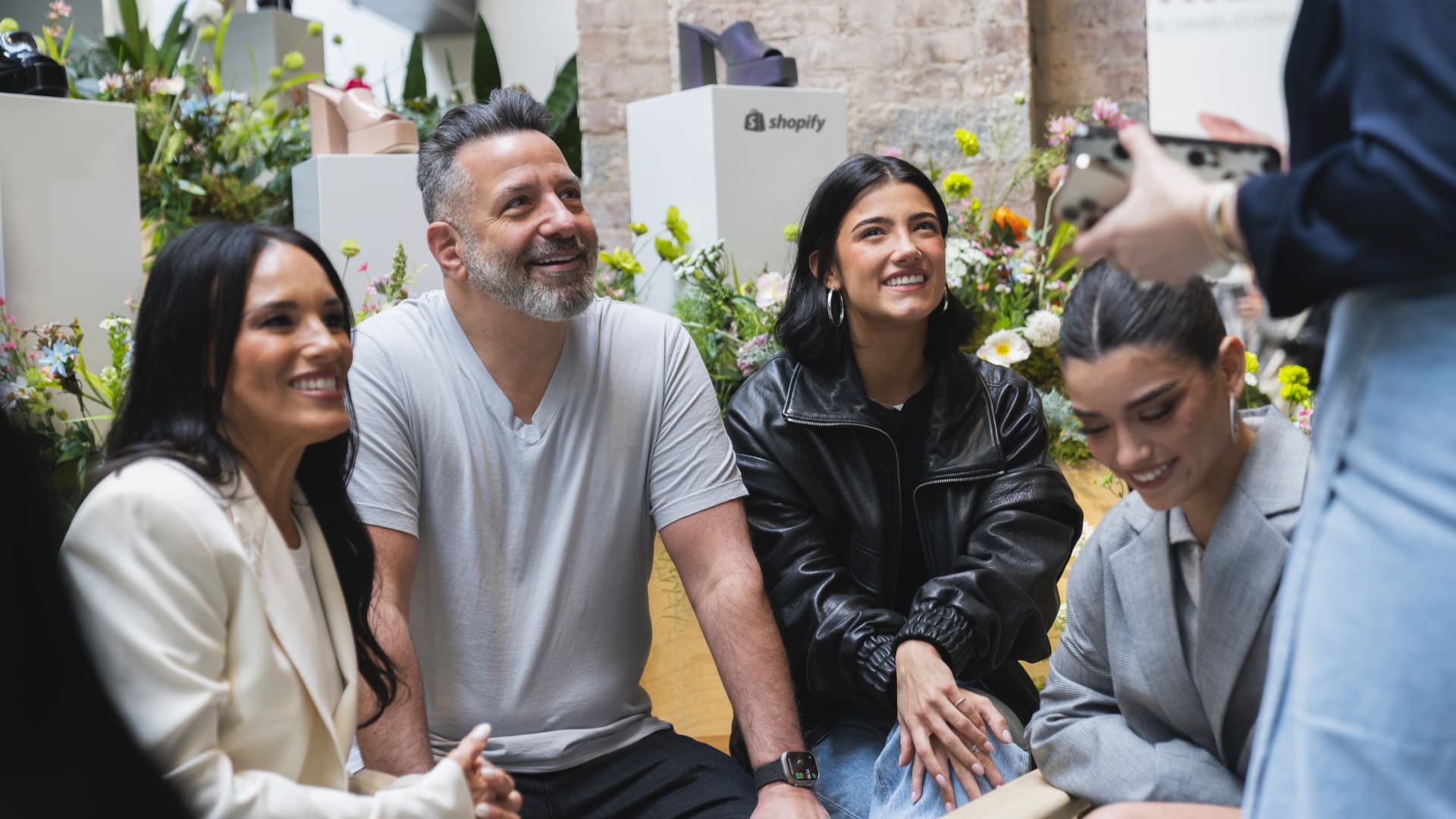Heidi, Marc, Charli, and Dixie D’Amelio at Shopify’s D’Amelio Footwear Pop-up in New York City
Shopify
Charli D’Amelio is the second-most followed creator on TikTok, where the 19-year-old former competitive dancer and her sister Dixie have made tens of millions of dollars.
But D’Amelio can’t be certain how long she’ll be able to serve up short viral videos to her 152 million followers. That’s because a bill supporting a potential ban of TikTok, which is owned by China’s ByteDance, is headed to the House floor and already has the support of President Joe Biden.
Uncertain of which way the political winds will blow, D’Amelio is looking to build her presence elsewhere. Her latest endeavor is a partnership with Shopify to bring her family’s online shoe brand to physical stores.
“You have to remember that social media comes and goes,” D’Amelio said in an interview at Shopify’s D’Amelio Footwear Pop-Up in New York on Friday. “There’s new apps, there’s new people, there’s exciting new trends. You don’t always get to be first in line for everything.”
D’Amelio and other family members spoke to CNBC at the store opening. Given the political and national security concerns surrounding TikTok, creators are focusing on other ways they can sell their brand.
“Starting a brand…gets you out of it,” said Marc D’Amelio, Charli’s father and CEO of D’Amelio Brands. “It’s a hamster wheel, and it gets you out of that. And you’re less dependent on the platform.”
Members of the House Select Committee on the Chinese Communist Party introduced a bill last week that would require ByteDance to divest TikTok or face a U.S. ban. On Thursday, the committee voted 50-0 to send the bill to the House floor. Biden said on Friday that he’ll sign legislation if Congress passes it.
While TikTok CEO Shou Zi Chew has denied any ties between the app and the CCP, U.S. regulators and lawmakers have expressed fears about the company’s Chinese ownership and the possibility that user data could be shared upon request with the government.
“There’s definitely a little bit of fear when it comes to social media, just because you never know what’s coming next,” Charli D’Amelio said.
D’Amelio gained popularity on TikTok in 2019, and two years later was named the platform’s highest-paid creator by Forbes. She and her sister made a combined $27.5 million that year, the magazine said.
On TikTok, users can make money through the app’s Creativity Program, a rewards systems targeted at popular videos that are longer than a minute. Creators can also earn revenue from brand partnerships, affiliate sales on TikTok Shop, and followers can send users “gifts” during livestreams.
Since the family’s rise to fame, its members have been featured on the Hulu reality show, “The D’Amelio Show,” which just completed its third season. The sisters have also worked with various fashion brands including Prada, Burberry, and Puma.
The Shopify logo is pictured outside the The Well building on Spadina Ave. in Toronto.
Lance Mcmillan | Toronto Star | Getty Images
In September 2022, the family launched D’Amelio Brands, with products including D’Amelio Footwear and popcorn line Be Happy Snacks. The venture raised a $6 million seed round in 2022 from prominent figures like Fanatics CEO Michael Rubin, entrepreneur Richard Rosenblatt and Eddy Cue, Apple’s Senior Vice President of Services. Last year it raised $5 million from Fifth Growth Fund.
With Shopify, the D’Amelio family partnered to bring its shoes to pop-up events in Los Angeles and New York. Shopify powers the stores through the company’s point-of-sale system.
Shopify said D’Amelio Brands next aims to open a permanent brick-and-mortar store, bridging the gap between the digital creator economy and the physical retail world.
Shopify reported a fivefold increase in offline sales since 2019, indicating a notable shift in consumer behavior.
“Fans really want to come and feel the brand and meet the creators and touch and feel the products,” said Jessica Williams, Shopify’s Director of Brand Partnerships, in an interview
In 2023, offline sales accounted for $441 million of Shopify’s $7.1 billion in revenue, or a little over 6% of the total. That includes revenue from payments, subscriptions and point-of-sale hardware.
This story originally appeared on CNBC

